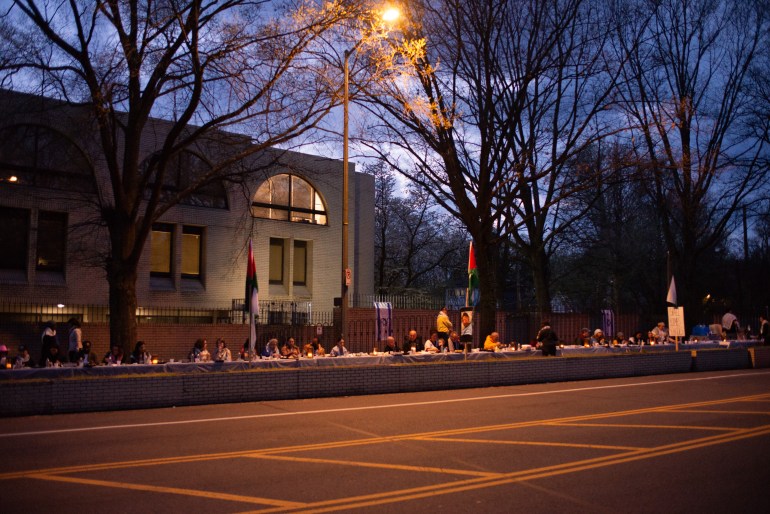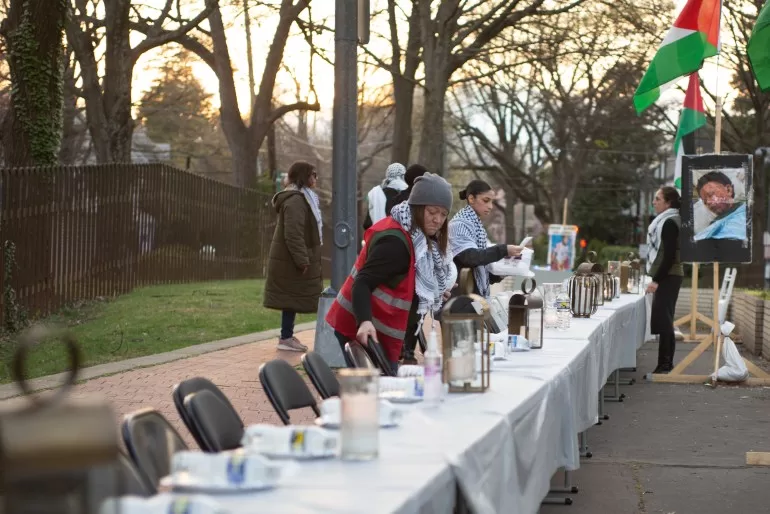“It’s OK, some of us will stand,” said 60-year-old Haitham Arafat, a soft-spoken, bespectacled man in a keffiyeh and a canary yellow shirt.
But soon, more chairs arrived, and were quickly lined up along 40 metres (131 feet) of table that stretched along a street facing the Israeli embassy in the northwest corner of this US capital city. A row of Ramadan lanterns lit the place settings ahead of the iftar meal.
“We break fast here every day,” said Arafat, who has been coming to the embassy for the last 21 days as part of a 24-hour, seven-day-a-week protest. “But today is special.”
The long-haul demonstration began 35 days ago, inspired by a sister demonstration outside the Virginia home of US Secretary of State Antony Blinken. That protest – dubbed Kibbutz Blinken – has been going for 68 consecutive days.
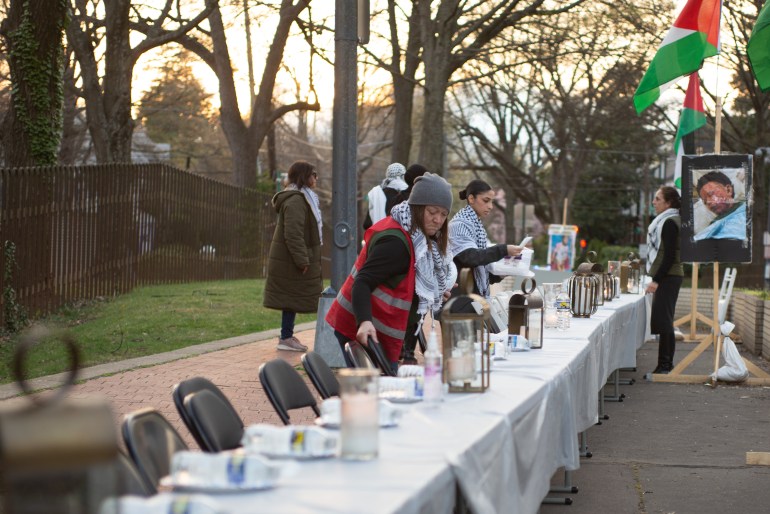
But on Sunday, family and friends of protesters were invited to attend an iftar meal at the Israeli embassy. Arafat described it as the latest effort to show the community’s resolve as the killings and deprivation in Gaza continue.
Like many of those gathered, Arafat simply would not entertain the notion that fasting for Ramadan was a burden, noting that he has personally lost about 100 relatives in northern Gaza since October 7.
“With the massacres that are happening in Palestine, the starvation, this is nothing compared to what they are experiencing,” he said, his voice growing sharper as he spoke. “If we can just experience a little bit of their hardship, just to show them that ‘Hey, we think of you every day, we’re doing our best to stop this madness.’”
Soon, Nora Burgan began dispensing hot drinks and cups of tomato and lentil soup to ward off the brisk air of early spring. Salad, dates, kebabs, rice and hummus were spread along the table’s expanse. People took their seats, sitting along one side of the table under a sky that had threatened rain earlier but was now beginning to clear.
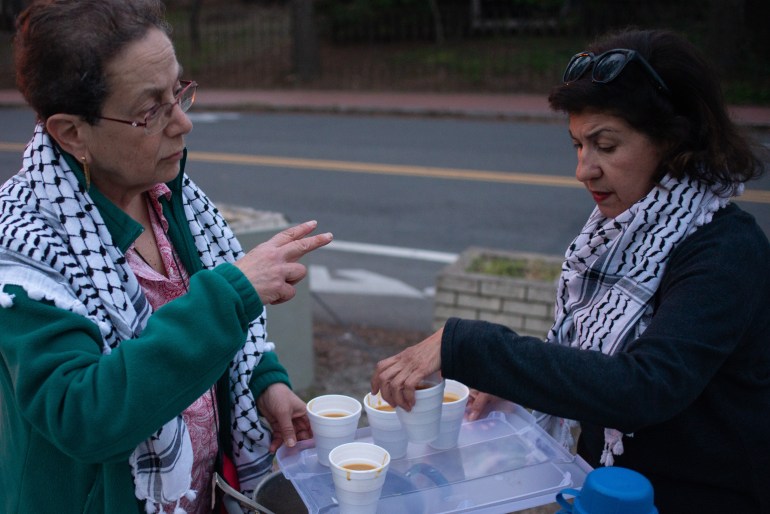
“It’s not meant to be a feast,” Burgan told Al Jazeera. “It’s not perfect, but we will share whatever food we have … very simple, humble and accepting of community and this moment.”
“We want to always think about Gaza, a free Gaza and a free Palestine,” she told those who had gathered for iftar.
As of Monday, the official death toll in Gaza had reached 32,845, with humanitarian organisations continuing to warn of impending famine while accusing Israel of blocking the delivery of food, medicine and other supplies to the enclave.
Israeli Prime Minister Benjamin Netanyahu has maintained that Israeli forces will move ahead with an offensive in the southern city of Rafah, where most of Gaza’s displaced have fled.
Meanwhile, warnings from US President Joe Biden’s administration have not yielded any substantive changes on the ground in Gaza. Last week, the Washington Post reported the administration had signed off on yet more weapons transfers to Israel, including one-tonne (2,000-pound) bombs linked to mass casualty events.
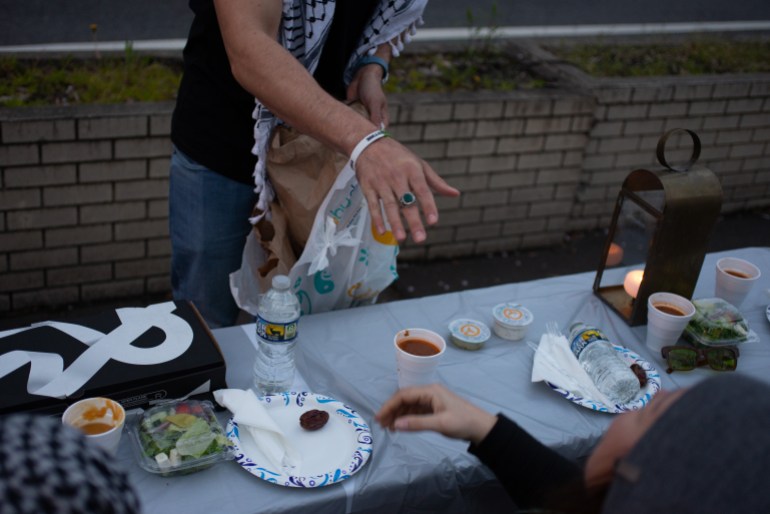
‘Unapologetically out here’
As the day’s fast broke and the evening turned a darker shade of blue, Hazami Barmada, the activist who spearheaded the camps at Blinken’s home and the Israeli embassy, stood over the now-crowded span of table.
“We are unapologetically out here breaking bread, side by side in solidarity on a main road, in front of the very thing that does not want us to be here,” said Barmada, whose watermelon earrings danced while her 16-month-old son shifted his weight in her arms.
Barmada has learned a lot about this type of protesting in recent months. The demonstration at Blinken’s home began with just Barmada and a few others, who began to stay around the clock.
At the end of February, she landed in the emergency room with a fever of more than 40 degrees Celsius (104 degrees Fahrenheit).
But the effort has become more formalised since, with schedules and rotating shifts to relieve some of the pressure on the protesters, as well as providing them with a support system to help with needs such as child care or transportation. Barmada believes that the unrelenting demonstration is unique in its ability to shine a light on the public outrage over what is happening in Gaza.
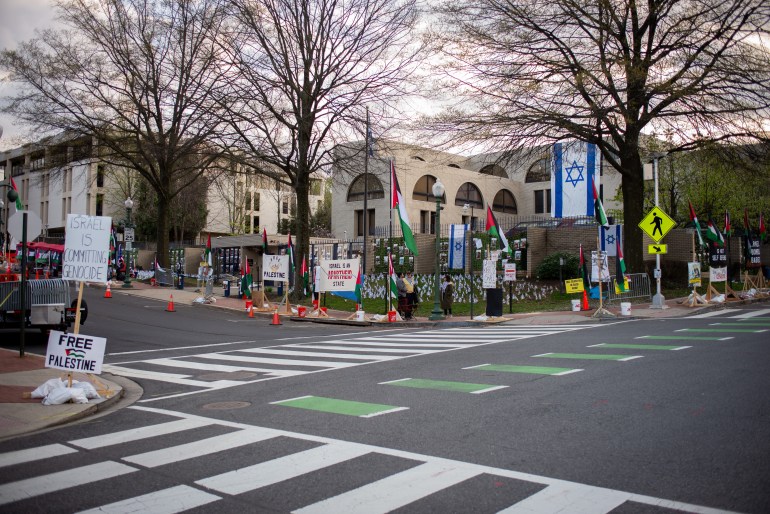
Barmada has also become adept at making sure the demonstrations remain peaceful and in compliance with local regulations, while also managing to confront counterprotesters, angry embassy staff and the ever-present US Secret Service and local police.
Demonstrators document their interactions to avoid false charges that could conceivably shut down the protests, she said.
‘Part of resistance is finding joy’
Some protesters have been involved in the marathon demonstration since the beginning, and others have just joined.
“I think it’s a moral boost for us coming out here and being in a community,” said 41-year-old Jinan Deena, who waved a Palestinian flag in front of the embassy in what she said was her second day of protesting there.
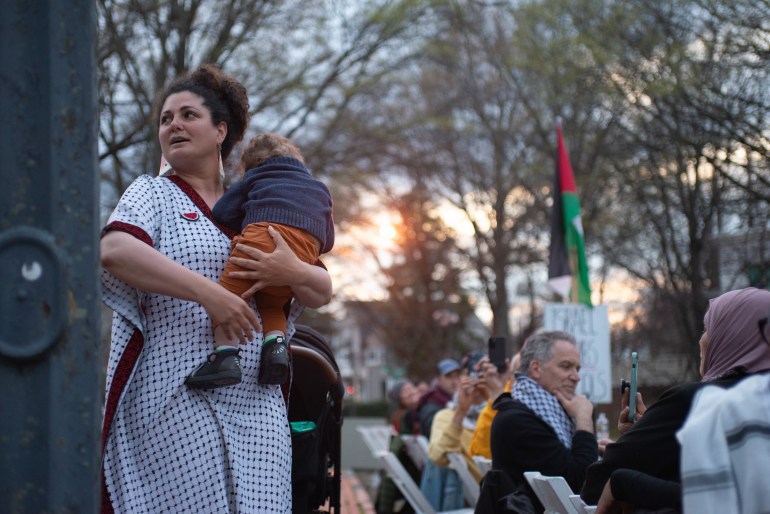
“But also seeing the symbolism of an Israeli embassy being occupied by Palestinians. It’s kind of like a reverse occupation,” Deena said.
The scene reflects the deep divide that is inherent in the conflict, with photos of bloodied Gazan children surrounded by Palestinian flags and signs reading “Genocide is Not Self Defense” and “Israel bombs babies”.
On the embassy’s grounds, Israeli flags are planted in the grass or hung on external walls, next to photos of Israelis taken captive on October 7.
As the crowd of about 60 people began to eat, a quiet calm settled over the meal. Those who arrived late were greeted with a familiar refrain: “Have you eaten? Have some food.”
A vegan was identified and quickly informed of all viable options.
“How is it?” a woman asked of her homemade shorbet adas, a traditional Ramadan lentil soup. “I made it, but I did not taste it yet.”
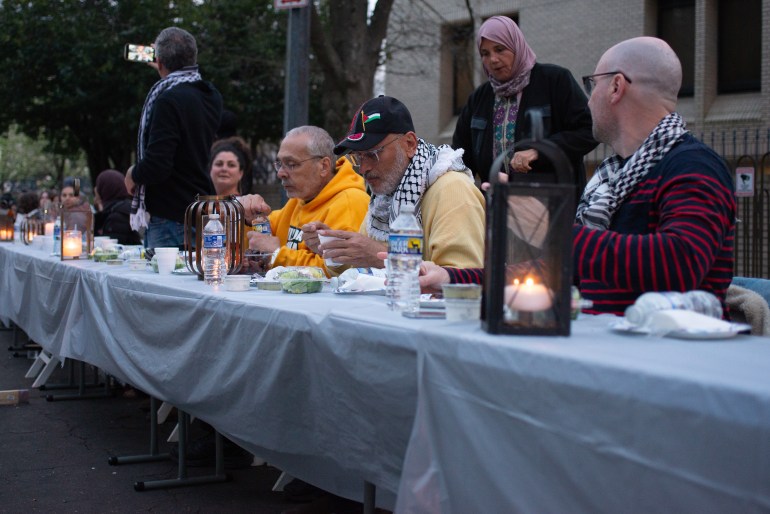
As the streetlights came on, the diners passed katayif – a walnut or cheese-stuffed Palestinian sweet – along the breadth of the table.
Ahmed Afifi, 28, said the night had offered a rare opportunity to meet fellow activists he had only previously encountered through texts or social media.
“It’s nice to actually have this today,” he said. “With all the atrocities going on, it’s important to remember that part of resistance is finding joy and feeling joy with people that share the same goals as you.”
“For me, that’s beautiful and inspiring, and I’m inspired by all of them,” he said.
By 8:30pm, the clean-up had begun, with tables cleared and folded almost as quickly as they appeared. Some chairs were returned to other areas of the protest camp, for those who would stay the night.
The meal ended with a huddle for a group photo, followed by an impromptu chant.
“Ceasefire now,” they said in unison. “Let Gaza live.”
